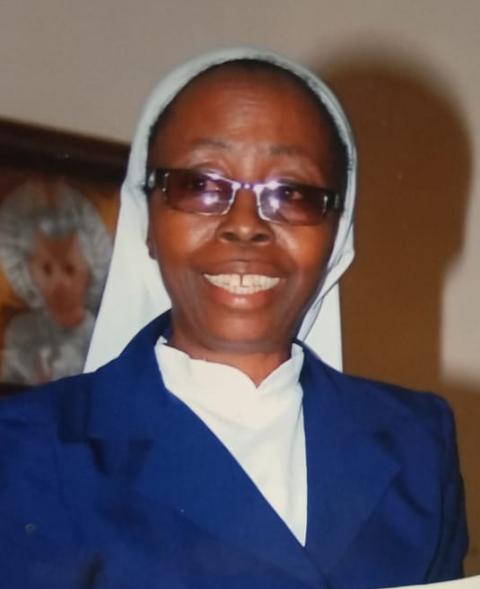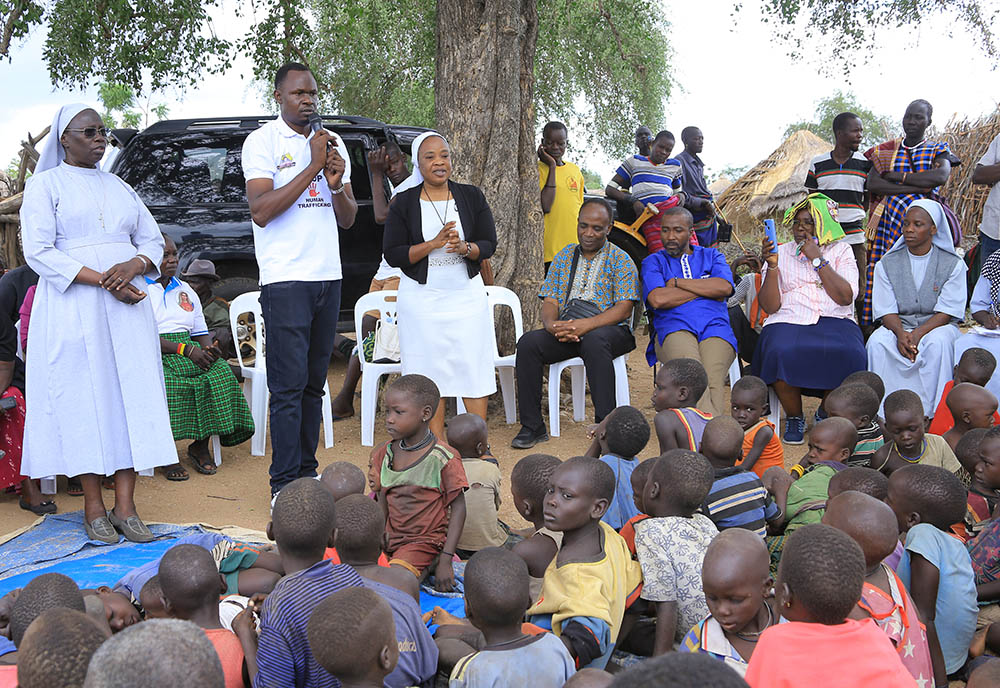
From left: Sr. Mary Lilly Driciru, a Missionary Sister of Mary Mother of the Church and coordinator of the Africa Faith and Justice Network women's empowerment program in Uganda; a translator; and Notre Dame de Namur Sr. Eucharia Madueke address a rural community in Karamoja, Uganda, about child trafficking to Kampala, Uganda. (Courtesy of Eucharia Madueke)
As they celebrate the Africa Faith and Justice Network's 40th anniversary, the leadership of the Catholic pan-African advocacy organization say they've survived and thrived since 1983 because of the organization's ability to adapt over the years.
"We have remained resilient," Steven Nabieu Rogers, the network's current executive director, told NCR.
When the Africa Faith and Justice Network (AFJN) was founded 40 years ago, white missionaries brought their concerns from serving on the continent to the decision-makers of Washington, D.C. These days, the organization, which is now African-led, focuses on empowering Africans to do advocacy in their own communities, in addition to their Washington-based lobbying work.
Dominican Fr. Aniedi Okure, who was executive director from 2011 to 2020, proposed a major change to the organization's approach in 2012.
Advertisement
"AFJN would be more effective if we expanded our advocacy to Africa by training Africans in advocacy and let them hold their governments accountable," he recalled telling the board. And they agreed.
In 2016, that vision expanded when Okure proposed a women's empowerment project that would tap the power of Catholic sisters to create structural change in their communities. (Okure continues to consult on this project even as he now represents his order as a permanent delegate at the United Nations.)
When Notre Dame de Namur Sr. Eucharia Madueke came to the network to lead the women's empowerment project, she said that African sisters were mostly engaged in direct service, not the kind of advocacy she had witnessed from U.S. sisters while she was studying there.
Sr. Eucharia Madueke, coordinator of the Women Empowerment Project of the Africa Faith and Justice Network, poses for a photo in Lira, Uganda, after a four-day workshop on forced marriage and teenage pregnancy. (CNS/Courtesy of Eucharia Madueke)
Madueke wanted African sisters to be able to "tackle" the problems that they were seeing in their direct service in the public square. The network decided that the project would only include sisters, not brothers, priests or bishops, because, with those men involved, the sisters would shy away from taking the lead.
"Now the sisters are also beginning to realize that the church is not just the church of the bishops. We are also going to speak," Madueke said.
And that leadership has had an impact, especially when the sisters advocate to elected leaders who were educated by sisters. Madueke recalls one member of the Ugandan parliament saying, "Sisters, we are still your sons and daughters, so don't leave us. Just keep calling our attention."
Holy Child Jesus Sr. Bernadette Eyewan Okure, who coordinates the Africa Faith and Justice Network in Nigeria, remembers the first time that the sisters lined a street with placards as journalists and onlookers gathered. "They were shocked to see sisters, religious women from so many congregations collaborating, protesting," she said.
"From there, we began to conscientize the nation that it was possible to really emphasize advocacy more than charity. Charity is good," Eyewan Okure said, "but we have to change rules and policies."
"We wouldn't say we are going to help them, but that we are helping each other. If we help a community to become better, to relate better, to protect the rights of their children, then that affects us," Eyewan Okure said. "In our coalition, in our collaboration, we are helping the work of God, the kingdom of God to grow, to expand," she said.
Eyewan Okure said that the network has practiced synodality in Nigeria from the beginning. A key skill of advocacy that the sisters learned, Eyewan Okure said, was to listen to people telling their stories, eventually "helping them to gradually discover the strength within them."
Through the project, the network has worked to address human trafficking, including sex, organ and child trafficking. According to Fr. Okure, the sisters have had major victories in Nigeria and Zambia, but their work continues.
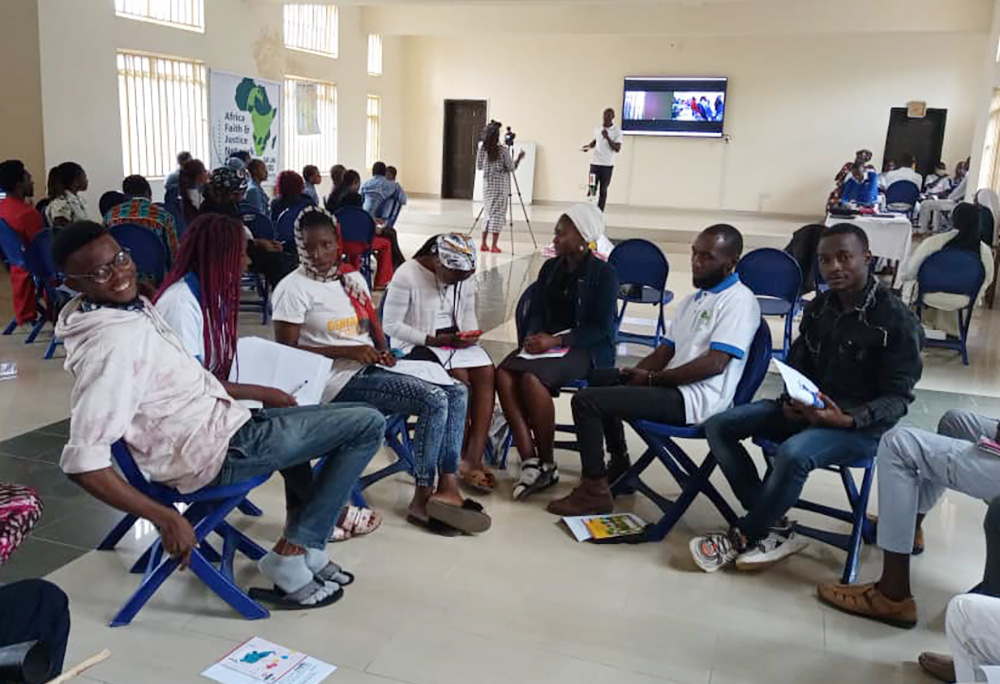
A group participates in a working session after an intensive advocacy training workshop sponsored by Africa Faith & Justice Network in Nigeria. (Courtesy of Bernadette Eyewan Okure)
When NCR interviewed the network's leadership, the team was visiting Karamoja, the origin point of the majority of child trafficking in Uganda, and then gathering Karamojong leaders to go to Kampala to witness what is happening to children who are trafficked there and to advocate to the Ugandan parliament for change.
In Uganda, sisters have used similar strategies to advocate around child marriage and forced marriage, education inequalities and domestic violence.
Sr. Mary Lilly Driciru of the Missionary Sisters of Mary Mother of the Church from Lira, Uganda, has participated in the Africa Faith and Justice Network's Uganda advocacy. She connected with the network in 2018 while committee secretary for justice, peace and integrity of creation for the Association of Religious in Uganda.
Driciru told NCR in a Whatsapp message: "I have found fulfillment since I met AFJN. It acted as a springboard to hurl me to this level. It has given me platforms, strengthened my capacity, experience, resilience."
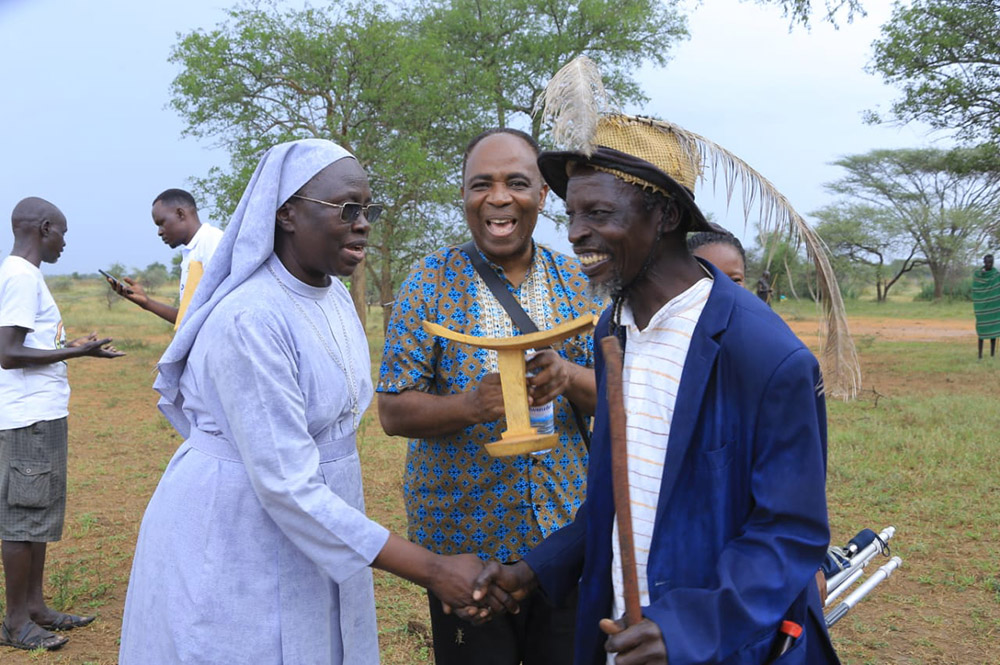
Sr. Mary Lilly Driciru of the Missionary Sisters of Mary Mother of the Church shakes hands with a Karamojong elder who helped coordinate Africa Faith and Justice Network and the local community, as Dominican Fr. Aniedi Okure holds a stool, a symbol of authority gifted to the network. (Courtesy of Mary Lilly Driciru)
Madueke said the women's empowerment project helped her figure out "where to begin" on her "passion for justice."
"I have also been empowered while I was trying to empower others," she said.
Sisters have lent a hand to the network's other projects, including the just governance program, which currently focuses on corruption in Cameroon and land grabbing in Ghana.
Rogers said that, in Ghana, multinational corporations are using predatory practices to cheaply buy large amounts of land without properly informing or involving local people in decision-making.
In the last few months in Ghana, the network helped people in the town of Gbokpo in the Dorfor region successfully push back against a local company that was polluting the community's only water source.
In Cameroon, the network has worked with the bishop of Bafoussam to try to root out corruption within Catholic schools in the diocese.
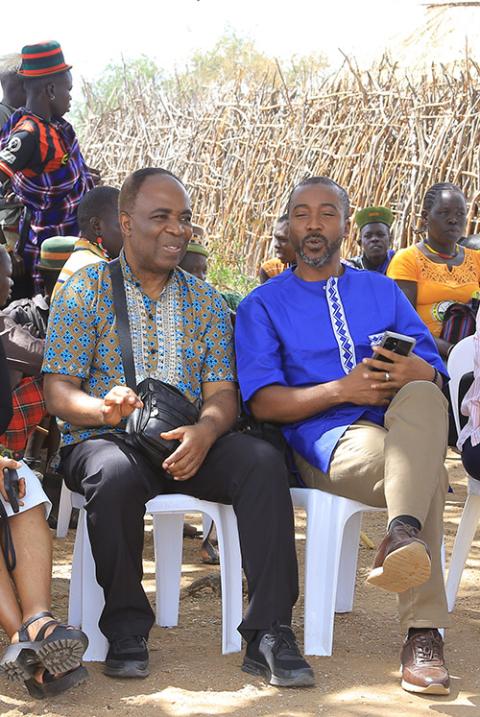
Dominican Fr. Aniedi Okure, left, and Steven Nabieu Rogers sit in chairs while visiting a rural community in Karamoja, Uganda. (Courtesy of Eucharia Madueke)
More recently in Cameroon, the Africa Faith and Justice Network has been working to remedy the situation of many children, especially Muslims, who do not receive free birth certificates within their first 90 days of life, which leads them to become "stateless." The network has worked to help more children gain birth certificates and also advocated for changes to the law to make sure newborns receive birth certificates.
At the 40th anniversary celebration on Oct. 14, the Africa Faith and Justice Network will honor Notre Dame de Namur Sr. Maura Browne, who has been involved with the organization since its founding. Madueke said Browne is an "inspiration" to her.
When the network was founded shortly after many African countries gained independence from their colonizers, it was led by the provincials of three men's congregations, the Spiritans, the Missionaries of Africa and the Society of African Missions.
Browne, who came to the network in 1984 after serving as a teacher in Kenya, was the first and only woman executive director of the organization through much of the 1990s.
While other Africa-focused advocacy organizations in Washington centered their work on ending South Africa's apartheid, Browne said the Africa Faith and Justice Network spent its early years working on "overlooked" issues, like food security, refugees, debt, and the negative impacts of the structural adjustment policies of the World Bank and International Monetary Fund, even while supporting other organizations advocating against apartheid.
While Browne said that non-African missionaries had done a "good job" leading the network and including African voices, "I find that we have made tremendous progress now that we have Africans running AFJN," she said.
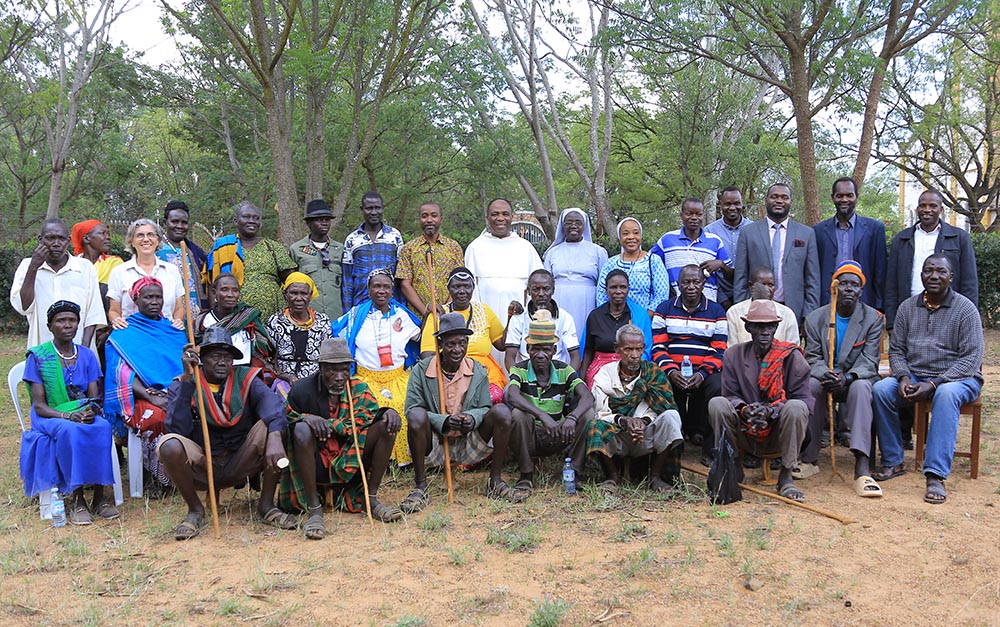
Africa Faith and Justice Network members pose Sept. 27 with traditional leaders who participated in a three-day enlightenment program on child trafficking in Karamoja, Uganda. (Courtesy of Eucharia Madueke)
Browne said that missionaries must practice the "socio-theology of letting go" and that Gospel values have guided that transition. "Prayer is so important," Browne said. "The day we don't pray this organization is going to fall apart."
Multiple network leaders stressed the perennial difficulty of securing funding. "Sometimes funding is a problem. We always feel like we are not going to be surviving for the next two years," said Rogers.
Even with these difficulties, Rogers' dreams for the network's future include acquiring a physical space in Washington, D.C., to reinforce its influence on U.S.-Africa relations, and engaging young Africans on the continent's most serious problems, like water distribution.
For Fr. Okure, dreams for the network's future include expanding to more countries and broader coalitions within Africa.
Within the many visions for the Africa Faith and Justice Network's future, there is broad agreement that its new African leadership and focus on Africa has helped.
"If AFJN had not moved to Africa, I think by now it would have stopped. But it moved to Africa, where it really belonged," said Eyewan Okure.

